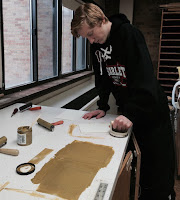Day
Six – Late Start, Sticky Fingers, Layer Two
 Late
starts and printmaking don't really mix, or in better terms, a short
amount of studio time is really hard on the students work. But I was
surprised with the amount of work pushed out by students in 33
minutes. Second layers were pushed down and final first layer cuts
were made. Seeing works coming together gets everyone looking
forward.
Late
starts and printmaking don't really mix, or in better terms, a short
amount of studio time is really hard on the students work. But I was
surprised with the amount of work pushed out by students in 33
minutes. Second layers were pushed down and final first layer cuts
were made. Seeing works coming together gets everyone looking
forward.
There
is just something so cool to see the students roll that first layer
of color over their tan plates and see the image come to life. I've
literally heard students go, “Wow” after their first piece of
paper is printed. Looking at a drab plate you've sent hours carving
isn't the most exciting thing. Students switch so quickly from hating
the project to liking it.
 Printmaking
is a love/hate type of thing, similar to any art form. But it's not a
instant reaction type of process versus drawing or painting. We don't
make one or two marks to create a final product, we have to make many
many many marks and follow several steps to get to that final piece.
Printmaking
is a love/hate type of thing, similar to any art form. But it's not a
instant reaction type of process versus drawing or painting. We don't
make one or two marks to create a final product, we have to make many
many many marks and follow several steps to get to that final piece.
From
my old-folky printmaking heart -
As
people by nature are experimental and perceptive; valuing experience
and quality in any work form, and printmaking is no different. And
when you are printmaking, it’s not only the final product but whole
process and the experience that matters. It engages an artist’s
sense of work, which certainly makes print making a beautiful
experience.
 I'm
just excited to be sharing printmaking with these students, yes it's
a struggle, but all art is. Printmaking is not only an art form, but
a way we live and think today. It is through printmaking that we have
most of our earlier art forms reproduced and preserved for today’s
generation. Printmaking has actually formed the basis of the way
humans have developed art and literature.
I'm
just excited to be sharing printmaking with these students, yes it's
a struggle, but all art is. Printmaking is not only an art form, but
a way we live and think today. It is through printmaking that we have
most of our earlier art forms reproduced and preserved for today’s
generation. Printmaking has actually formed the basis of the way
humans have developed art and literature.
Why
is printmaking an important thing to teach? It forces students to
think in terms of a complicated process, rather than simply getting
pigment to reflect light and make images on canvas. They learn about
an art that straddles modern technology and the expressive arts.




No comments:
Post a Comment